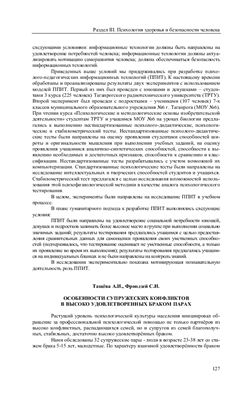1. Тащева А. И., Фрондзей С. Н. Особенности супружеских конфликтов в высоко удовлетворенных браком парах.
Известия ТРТУ.
Растущий уровень психологической культуры населения инициировал обращение за профессиональной психологической помощью не только партнеров из высоко конфликтных, распадающихся семей, но и супругов из семей благополучных, стабильных, достаточно высоко удовлетворенных браком.
2. Ю. В. Дойникова. Поведенческие стратегии супругов в период конфликтного внутрисемейного взаимодействия: гендерный аспект
Вестник Удмуртского Университета. социология и философия 2006. №3
Исследовано воздействие характера и содержания конфликта на формирование поведенческих супружеских стратегий; проанализированы поведенческие модели супругов в период дезинтеграции и распада брачно-семейных отношений.
Ключевые слова: брачно-семейные отношения, конфликт, конфликтное внутрисемейное взаимодействие, поведенческие стратегии, развод.
3. Carl A. Ridley & Mari S. Wilhelm. Married couples’ conflict responses and marital quality.
Joual of Social and Personal Relationships 18(4)
ABSTRACT
In order to further our understanding of conflict within a marital relationship, this study had two purposes: (i) to identify married couples’ conflict response profiles, and (ii) to relate these conflict profiles to appraisals of marital quality. Spouses in 173 intact married couples completed a question-
naire that included measures of a sample of aggressive, with-drawing, and problem-solving responses occurring during conflict episodes, and indices of marital quality. Cluster analyses of married dyads’ conflict responses generated four conceptually interesting profiles – two symmetrical (‘distancing
couples’ and ‘engaging couples’) and two asymmetrical (‘distancing husbands’ and ‘distancing wives’). Results indicated that couples who endorse different conflict profiles could be distinguished according to their level of marital adjustment. The advantages to understanding conflict responses within a
marriage by studying the couple as the unit of analysis were highlighted.
KEYWORDS: conflict response marital conflict marital quality.
4. Jae-Yop Kim, Clifton Emery. Marital Power, Conflict, Norm Consensus, and Marital Violence in a Nationally Representative Sample of Korean Couples.
Joual of interpersonal violence, Vol. 18 No. 2, February 2003 197-219
Keywords: domestic violence; power; norm consensus; conflict; South Korea.
5. Larry A. Erbert. Conflict and dialectics: Perceptions of dialectical contradictions in marital conflict.
Joual of Social and Personal Relationships 17(4–5)
ABSTRACT
This study examined the perceived importance of six basic dialectical contradictions to conflict episodes for 25 marital couples. Using a revised version of the Retrospective Interview Technique (RIT) and questionnaire data, marital couples were asked to recall important conflict episodes, coded for
issue type, over a 1-year period. Following in-depth questions about the conflicts, a questionnaire was administered that asked participants to rate 6 basic dialectical contradictions according to their importance for each conflict episode. A second questionnaire was also administered that asked participants to determine whether conflicts were dialectical(antagonistic and non-antagonistic) and/or non-dialectical, relative to each conflict episode. Results reveal that the dialectical contradictions of autonomy–connection and openness–closedness were perceived as more important than the other
contradictions. Two other contradictions (integration–separation, predictability–novelty) were perceived as important for particular conflict issue types.
KEYWORDS:
conflict and dialectics marital conflict relational

